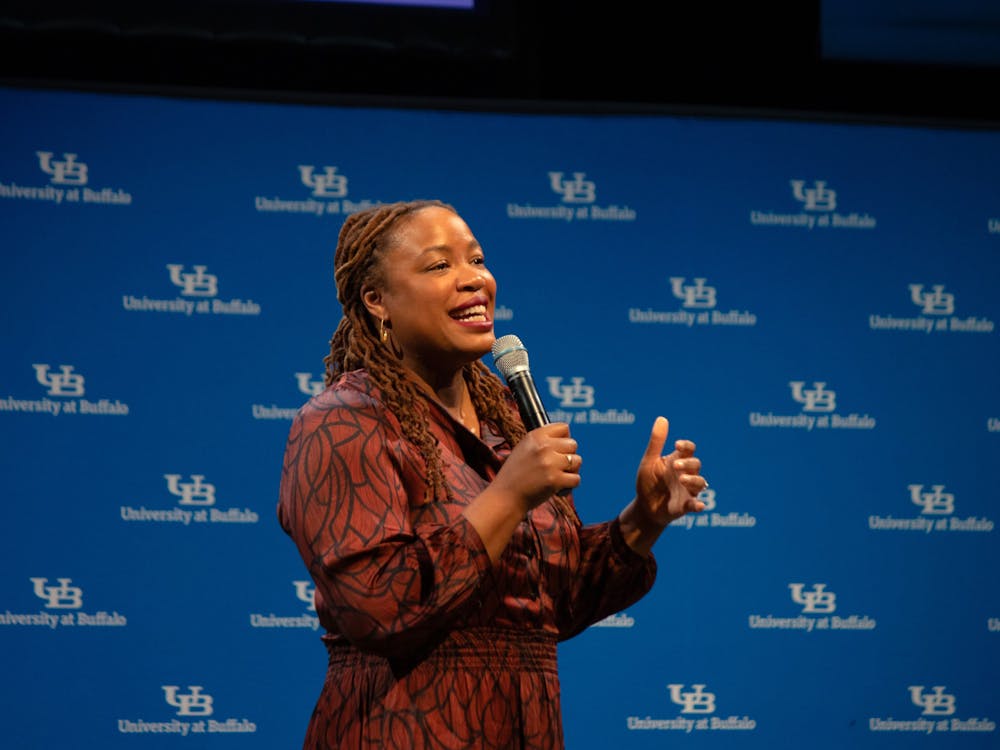Heather McGhee took to the CFA mainstage Wednesday night as the third lecturer in UB’s Distinguished Speaker Series to talk about her book: “The Sum of Us,” a record of her journey across America to dive deep into the country’s racial and social inequalities.
Going into the writing process, McGhee had one question: “Why can’t we have nice things?”
The answer? The zero-sum theory: the lie that if people of color get access to more opportunities, white people will consequently lose something.
“It’s marketed as an existential threat,” McGhee said. “And we here in Buffalo know the very human cost of people believing that lie.”
To explain this cost, McGhee described a family trip to a public park in Montgomery, Alabama. The park was built on the remains of a public swimming pool that was filled in by white residents after the federal government ordered them to integrate and share it with their Black neighbors.
This doesn’t exactly make the park unique: with similar unfolded in New Jersey, Washington D.C. and Ohio.
This event is part of a trend McGhee calls “drained pool politics.”
“I became obsessed with what was going on with these public pools, with the loss of this big, beautiful investment in the nice things in life,” McGhee said, “and the racialized zero-sum thinking that compelled people who could have freely enjoyed this free public good to destroy it rather than share it.”
That lie unfortunately costs white Americans — the majority of whom believe it — “a lot to buy it,” McGhee says. She doesn’t blame the people who’ve bought into that lie — but she does blame the people who spread it.
“It’s a lie only ever always sold by people with absolutely everything to gain from sowing division among people with a lot more in common,” McGhee said. “It’s a lie sold and marketed by bullies in the corporate media, politicians looking to gain power to line their own pockets.”
But despite her dismal assessment of zero-sum thinking and where it’s taken the U.S., McGhee remains optimistic. The more she discovers, the more hope she gains.
“If I keep finding this common thread of racism in our politics and policymaking under all of these vexing public issues — healthcare, workers’ rights, education, housing — if we just pull at that common thread, then progress in each of these areas will be closer at hand,” McGhee said.
All of this leads McGhee to another question: “What if addressing racial division and making deliberate common cause across race has more power than we think?”
McGhee describes that power — the power people get when they unite to overcome racial barriers — as “solitary dividends.”
As an example, McGhee told the story of Cecille, a woman in Lewiston, Maine who’s leading an effort to connect her town’s racially segregated French-Canadian majority and Francophone immigrants from the Congo at the Franco Heritage Center.
It’s these kinds of stories that help McGhee stay positive in the face of America’s uncertain sociopolitical future.
“I find [these stories] everywhere: people coming together and rolling up their sleeves, linking arms across race and fighting for solutions that would benefit the sum of us,” McGhee said. “I can’t do this on my own. It takes all of us coming together. It takes the public.”
Mylien Lai is an assistant arts editor and can be reached at mylien.lai@ubspectrum.com

Mylien Lai is the senior news editor at The Spectrum. Outside of getting lost in Buffalo, she enjoys practicing the piano and being a bean plant mom. She can be found at @my_my_my_myliennnn on Instagram.





